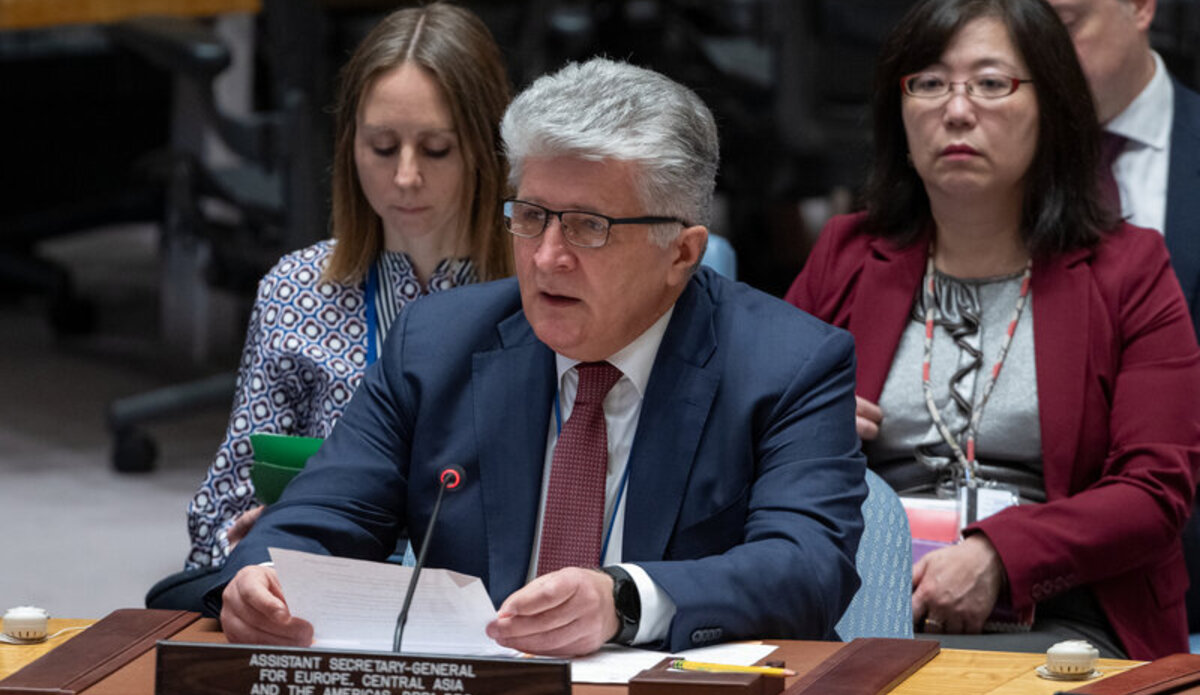ASSISTANT SECRETARY-GENERAL MIROSLAV JENČA’S
REMARKS TO THE SECURITY COUNCIL ON
UKRAINE
New York, 6 DECEMBER 2023
Mr. President,
The cold winter weather has arrived in war-torn Ukraine. Intensifying Russian attacks on the country’s energy facilities, amidst heavy snow and freezing temperatures, are worsening the dire humanitarian conditions across the country.
Since the last time I briefed this Council two weeks ago, we have continued to see daily reports of attacks on Ukraine’s critical civilian infrastructure, many resulting in civilian casualties.
Since Russia launched its full-scale invasion of Ukraine – in violation of the UN Charter and international law - the Office of the High Commissioner for Human Rights has verified 10,065 civilians killed and 18,679 injured. The actual figures are likely considerably higher.
Most civilian casualties continue to be caused by shelling and multiple-launch rocket systems in areas near the frontline.
However, the attacks have recently escalated on populated areas across the country. On 25 November, Kyiv came under the most significant drone attack in months.
The extensive presence of explosive remnants of war and mines continues to have a significant impact on civilians and their livelihoods, more so in rural areas and agricultural lands. Since August, they killed 31 people and injured 98 – mostly men and boys.
All attacks against civilians and civilian infrastructure must stop immediately. They are prohibited under international humanitarian law and are simply unacceptable.
Mr. President,
As a result of the war, ten million people have been forced to flee their homes, including 3.7 million internally displaced, and over 6.3 million refugees recorded globally.
While we can attempt to count the numbers of those killed, injured and displaced, the full lasting toll of this devastating war on the civilian population is beyond measure. In addition to the lives lost, families torn apart, and life-changing physical injuries, the impact of the war on the mental health of millions of Ukrainians will be felt for decades to come.
Children often suffer the greatest lasting trauma in any conflict. In Ukraine, they also face major disruptions in access to basic health and education, which will impact their lives for years.
The fighting has damaged and destroyed hundreds of schools, health and medical facilities. Given the security situation, only half of the 3.9 million children in the territory under Ukraine’s control have attended school in person full-time since the start of the school year.
Mr. President,
Due to the war, women in Ukraine face a heightened risk of sexual- and gender-based violence. Increased poverty rates caused by the war also affect women more than men. Women face a greater amount of domestic and unpaid care work due to family separation, lack of childcare facilities and school closures.
Yet, since the beginning of the war, women have also taken on new vital roles in their communities. Most frontline workers, volunteers and first responders in Ukraine are women.
Mr. President,
As long as the war continues, all four Ukraine’s nuclear power plants remain at risk.
On Saturday, the International Atomic Energy Agency reported that the Zaporizhzhia Nuclear Power Plant – Europe’s largest nuclear power plant, located dangerously close to the front line - suffered a complete off-site power outage. This was the eighth time since the start of the invasion.
Last Wednesday, the IAEA team at the Khmelnitsky Nuclear Power Plant in western Ukraine reported hearing several explosions close to the plant. The plant was not directly affected. Yet, the incident reminded of the risks faced by Ukrainian nuclear sites – even those away from active combat.
All nuclear sites must be able to operate safely and must be protected to avoid potentially catastrophic consequences.
Mr. President,
Despite the reports of increasing shipments in the Black Sea, the war continues to pose significant risks to civilian navigation and to Ukraine’s grain export capacity.
Since 11 July, OHCHR has recorded 32 attacks that damaged or destroyed grain production and export facilities in territory of Ukraine under Ukrainian control. Russian attacks hit port facilities, grain silos and vehicles for transporting grain. Most attacks affected infrastructure in Odesa region, where the Black Sea and Danube River ports are located.
Following the suspension of the Black Sea Initiative, these attacks substantially reduced the capacity of Ukraine to export food. With so many facilities damaged, and export routes curtailed, the cost of logistics is rising.
Mr. President,
Much like last year, the year 2023 has been devastating for the people of Ukraine.
If urgent steps are not taken to reverse this trajectory, next year may be even more unpredictable and destructive.
I reiterate the Secretary-General’s call to all Member States to do their part to lay the groundwork for peace. Peace that is in line with the UN Charter, international law, and resolutions of the General Assembly.

